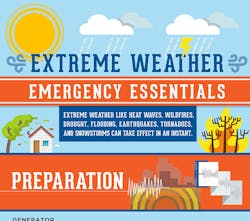If you are a contractor working in hurricane country, you can expect a surge in demand. Here’s how to stay out of trouble when you respond.
It’s a fundamental law of economics that when demand exceeds supply, prices must rise or shortages occur. Yet the media, government, and public act like the laws of economics should not apply following a natural disaster. Shortages and delays result.
Gas Shortages
After Hurricane Harvey struck the Texas coast, a couple of media reports came out that suggested there would be a gasoline shortage due to the short term closure of the Gulf coast refineries. Sure enough, people panicked and we had shortages. Would we have had them without the media? Who knows?
Being focused on work, I was unaware of the pronouncements and panics, though I did notice an incredibly long line at the local gas station. My wife informed of the problem and noted where she had gone to fill up. With 30 miles of range left before I was empty, I hustled over and filled up my truck.
I didn’t need to fill up. In two days I was hopping on a plane and wouldn’t return for a week, but like most people I would rather fill up than come back a few days after I returned.
The next day, on my drive to work I noticed gas station after gas station without gas or with gas and long lines like I hadn’t seen since Jimmy Carter was president. People simply couldn’t find gas and when they could, they lined up and drained the station of its supply.
One woman at the office found an open gas station over lunch. It was off the beaten path and the price of gas was 25 percent greater than most area stations. Because it was more expensive, it had gas.
What if all gas stations were allowed to freely raise prices, not 25% but by a couple of bucks a gallon? Of course, media talking heads would snarl while their economically illiterate lips spouted venom about price gouging. But what if they didn’t? What if we acted like it’s perfectly normal and rational to raise prices? What would happen?
Personally, I might not have filled up if the price jumped by a dollar or two per gallon. I might have purchased just enough to get by until the supply stabilized and prices fell back. This would have made 15 to 20 gallons available for other people. Multiply this by a couple of million other drivers and the shortages disappear.
Fair Market Value
According to IRS Section 1.170A-1(c)(2), “fair market value is the price at which the property would change hands between a willing buyer and a willing seller, neither being under any compulsion to buy or sell and both having reasonable knowledge of the relevant facts.”
In other words, a fair price is whatever price a buyer and seller agree upon. Last weekend, I bought four tickets to a college football game for $150 each. The face price of the tickets was $100. I willingly paid a 50% premium. No one accused the guy scalping the tickets of price gouging.
The Lesson for Contractors
It is acceptable to charge a lot for entertainment. It is not acceptable to charge a lot for necessities following a disaster. HVAC is considered a necessity.
In an ideal world, contractors would raise prices following a disaster so price would sort out the people who want and need repairs the most. In the actual world, raising prices will see you hauled before a licensing board or charged by a district attorney or other politician trying to make a name by feigning indignation on the public’s behalf. Do not raise prices anytime in the near future.
If you run a profitable company that markets, takes care of the team and the customers, and invests in future growth, you undoubtedly charge a lot. The mere fact you charge a lot can result in accusations of price gouging.
Be prepared to defend your pricing. Diligently use your price books. Make sure you can access old invoices and match up the prices you charged for common tasks before the hurricane with the prices you charge after. Do not apologize for charging when you need to charge to earn a profit, but be prepared to defend it.
For FREE downloads of HVAC related business tools, visit www.ServiceRoundtable.com and click on the “Free Stuff” tab.
About the Author
Matt Michel
Chief Executive Officer
Matt Michel was a co-founder and CEO of the Service Roundtable (ServiceRoundtable.com). The Service Roundtable is an organization founded to help contractors improve their sales, marketing, operations, and profitability. The Service Nation Alliance is a part of this overall organization. Matt was inducted into the Contracting Business HVAC Hall of Fame in 2015. He is now an author and rancher.
